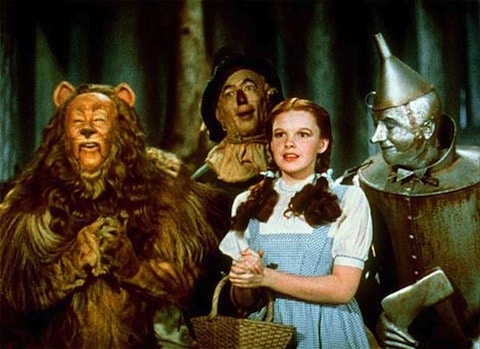The phrase "gay icon" gets tossed around a lot, but what does that really mean? Welcome to Gay Iconography, a new feature where we present a proposed iconic figure or character and then ask you to weigh in with your thoughts. So far we've looked at two pivotal television figures from the '90s (Rickie Vasquez from 'My So-Called Life' and Roseanne), but this week we tackle the heaviest of heavy hitters.
Any conversation about gay icons of past, present or future would simply be incomplete without mention of the legendary Judy Garland.
Whether it was the voice, the glamour, the tragedy or the ugly-duckling mentality, Judy has become the archetype for everything we expect a gay icon to be. While some younger generations may not identify as strongly with Judy personally, hers is the story we measure all other icons against.
Take a stroll down the old yellow brick road, relive some moments from Garland's career, and share your thoughts, AFTER THE JUMP…
The phrase "gay icon" gets tossed around a lot, but what does that really mean? Welcome to Gay Iconography, a new feature where we present a proposed iconic figure or character and then ask you to weigh in with your thoughts. So far we've looked at two pivotal television figures from the '90s (Rickie Vasquez from 'My So-Called Life' and Roseanne), but this week we tackle the heaviest of heavy hitters.
Any conversation about gay icons of past, present or future would simply be incomplete without mention of the legendary Judy Garland.
Whether it was the voice, the glamour, the tragedy or the ugly-duckling mentality, Judy has become the archetype for everything we expect a gay icon to be. While some younger generations may not identify as strongly with Judy personally, hers is the story we measure all other icons against.
Take a stroll down the old yellow brick road, relive some moments from Garland's career, and share your thoughts, AFTER THE JUMP…
As a young star working for MGM, Judy had a string of successes working with Mickey Rooney. The breakneck pace of cranking out film after film for the studio laid the groundwork for Judy's tragic struggle with drugs, having been given pills as a child star to keep up. These early years also reinforced the idea that Judy was not a conventional beauty. She was made to wear caps on her teeth and rubber discs in her nostrils, and also called fat and a hunchback.

An iconic song in any context, Over the Rainbow was declared No. 1 on the Recording Industry Association of America and National Endowment for the Arts' "Songs of the Century" list, as well as No. 1 on the American Film Institute's "100 Years … 100 Songs." It's also a quintessential gay anthem, telling the story of what it means to dream of a place where one truly fits in. It (at least partially) inspired the Rainbow Flag we fly today, and cemented Judy into the bedrock of the community with "friend of Dorothy" becoming synonymous with being gay. Many even say that Judy's death was part of the impetus for the Stonewall Riots.

It's hard not to love this over-the-top performance from 1949's In the Good Old Summertime. It even maintains its campy charm in GIF.

Even the banter that Judy shares with Barbra Streisand before this performance on The Judy Garland Show embodies a sort of self-aware humor and diva attitude one expects from icons. Once they start singing, however, the electric energy between those incredible voices reminds us while not all gay icons are as immensely talented, the legends are.

Long before Mariah Carey cornered the holiday music market with "All I Want For Christmas," this classic from Meet Me In St. Louis was essential listening to make the yuletide gay.
Does Judy's legend still feel as relevant to the gay community today? Why do you think some folks are reluctant to identify with Judy Garland? Sound off in the comments.




